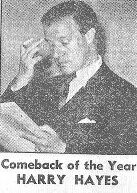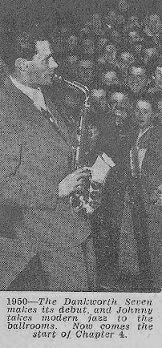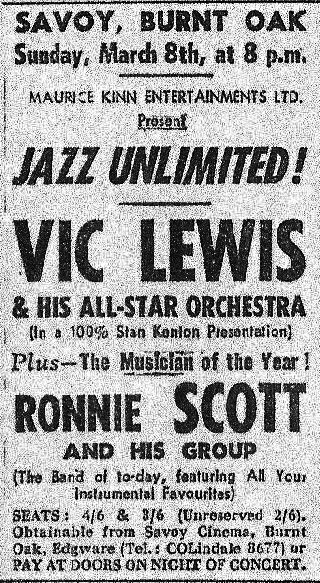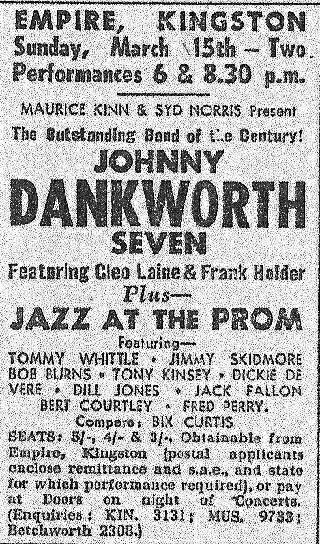










          |
| Snapshot from the Melody Maker (1953)... |
 |
| The "Melody Maker" was the leading weekly music paper and the clips below from March, June, August and October give an essence of the talking points concerning the British modern jazz scene...... Records of 1953... | ||
|
Melody Maker March 7, 1953...) (extracted from page 4)  The MM critics decided to hold a small unofficial poll amongst themselves this year - not so much as to spot the stars of the future as to determine which of the stars of last year were the most deserving of awards.
The MM critics decided to hold a small unofficial poll amongst themselves this year - not so much as to spot the stars of the future as to determine which of the stars of last year were the most deserving of awards.Near unanimity attended the choice of the Years Good Influence: The Kenny Baker - Pat Dixon radio show, 'Let's Settle for Music'. This programme has brought back jazz - with - a - sparkle to the air; it has a wider appeal than purely jazz shows; it has none of the plodding mediocrity of most dance band programmes. On the question of the year's most Underrated Musician, the opinion finally settled for pianist Eddie Thompson. There is always something interesting going on when Eddie plays piano - and there is often something to chuckle at. for he has wit as well as invention, melodic facility as well as drive. Close behind him came Gerry Moore ("perenially underrated"), Buddy Featherstonhaugh, Jimmy Skidmore and Dill Jones ("only British pianist who plays old and new with equal conviction"). Harry Hayes was finally seated in the Comeback of the Year spot, narrowly beating Norman Stenfalt. Harry Hayes's services to British jazz has been most high and long standing. From the time when, at the age of eighteen, he joined the fabulous Elizalde band at the Savoy he remained at the top of the saxophone tree until his voluntary retirement from playing around 1948. 1952 saw his return to the performing side of the profession - and what a return it was! The beauty of his alto tone without equal in the London musical scene gave a lead - in every sense - to the re - formed ambrose Orchestra, and his solos, as modern and tasteful as their environment, became an integral part of the Kenny Baker group. The Arrivals of The Year were Allan Ganley, Billy McGuffie and Mike McKenzie. Allan Ganley is the supreme example of that new school of drummers for whom we ought to extend the word 'ambidextrous'. The challenge for jazz drummers is to be relaxed and alert at the same time to catch any phrase that anyone else may play and to accentuate it while it has barely begun. It is a sort of musical telepathy : I have never known allan to fail at it. Billy McGuffie has qualities that make him unique where British pianists are concerned: a crisp incisive technique and inate sense of beat. As Steve Race once observed: "he generates his own beat." This ability is so rare on this side of the Atlantic that the musician who who proves the exception to the general rule justifiably finds himself a figure of discerning acclaim. Caribbean pianist mike McKenzie is very much a star of the present. Because of his partial immersion in Caribbean music, McKenzie's jazz talents may have been overlooked by uninquisitive enthusiasts. This year is certain to see a wider recognition of his talents. Finally came the Stars In The Ascendant - and on these few of the Critic had strong feelings. Joe Harriott and Benny Green were selected as the two jazzmen - most - worth watching in the coming year; the two most likely to be fully fledged stars at the end of it. Running them close were drummer Don Lawson, bassist Ken Napper and altoist Ralph Strelitz. Joe Harriott, a comparatively recent arrival from the West Indies, is quietly but rapidly making a name for himself with his Parkerish alto. He is an imaginative musician who has not so far been recorded. Benny Green has been playing professionally since 1948 but didn't get anywhere until he did eight weeks on tenor with Geoff Love in 1951. He followed up with a spell with Ralph Sharon. But when he replaced Harry Klein on baritone in the Scott band he found himself in demand around the West end clubs, and he is going to be demanded more. Melody Maker June 27, 1953 (Extracted from page 12) TO GO MODERN These old-time modernists will be part of a special feature called "Jazz Today" which will constitute the second half of the NJF's 1953 Jazz Carnival and which has been assembled by Harold Pendleton. Front line of the group comprises Laurie Gold (tnr.), Keith christie (tmb.), Bruce Turner (alto) and Dickie Hawdon (tpt). All four are noted for their catholicity of jazz tastes. Christie blew with a modern outfit assembled at Studio '51 by MM critic Mike Nevard. Turner a noted Konitz disciple is now with Humphrey Lyttelton. In the rhythm will be Dill Jones (pno.), Pete appleby (dms.) and micky ashman (bass). Jones, again, is a versatile jazzman who has played for Vic Lewis and the London Jazz club, with a wide range of accomplishments between. "It won't be bop, but you can expect some good lively sounds" states the NJF. Melody Maker June 27, 1953 (Extract from page 6) Jack Taylor's "Latin Quarter", featuring Winifred Atwell and Max Bygraves opens at Blackpool Hippodrome tomorrow........ |
Melody Maker June 27, 1953 (Extracted from the leading column on page 1) TO FORM NEW 20-PIECE  The Johnny Dankworth Seven, all set to complete it's hat-trick in next year's polls, is breaking up at the very peak of it's career. With the prospect of up to 365 dates next year, Johnny has nevertheless made a revolutionary decision to disband his present combo and form a 20-piece orchestra with a new sound.
The Johnny Dankworth Seven, all set to complete it's hat-trick in next year's polls, is breaking up at the very peak of it's career. With the prospect of up to 365 dates next year, Johnny has nevertheless made a revolutionary decision to disband his present combo and form a 20-piece orchestra with a new sound.The Seven plays it's last date at Leith. A few days later Johnny leaves for the Continent to work in seclusion on the assembly of a fresh, exciting repertoire for the new aggregation. Debut of the new Dankworth ork. is already set. It's eight brass, five reeds, three rhythm and three vocalists will first be heard on October 23 at Nottingham's Astoria Ballroom. Asked why he was making this sensational change in policy, Johnny Dankworth told the MELODY MAKER:- "For a long time the ambition has been growing on me to write for a big band. I am making this unexpected change because I now feel that the big band sound is the only medium in which I wish to express my musical thoughts and impulses in future." Johnny has in fact done that. For some time he has contributed scores to the Ted Heath library. Only nine years ago he was a struggling Dixielander with Freddy Mirfields Garbagemen, who won several awards for his clarinet playing. Later he switched to alto and when bop filtered into Britain his name was well featured in club line-ups. He toured with the all-star Tito Burns Sextet that included Ronnie Scott, Albert Hall, Joe Muddel, Tommy Pollard, Tony Crombie and Cab Kaye. When the Club Eleven was at the height of it's fame, Dankworth was the virtual idol of it's many habitues. Now, Johnny Dankworth is burning his boats and setting out after the big band crown. Melody Maker June 27, 1953 (Extract from page 4) urges Steve Race They know that to be successful they must have a stable band. and many of them have discovered all too late the dangerous eccentricities of some (repeat some) of the younger and more irrational musicians. Their inability to turn up for work on time, for instance, to play a melody dead straight, to be polite to the people who matter, or to leave the local fillyhood alone for even one intermission. Like the respected small-band leader who asked me to recommend him a pianist, they know that the only question worth asking about a potential employee is "how old is he?". If he's over 30 and a fair player, he's in. You can't altogether blame them. Many are the potentially successful bands which have dis-integrated simply because their members didn't know how to conduct themselves in public or in private. They went "once round" the ballroom dates and then broke up, because each successive town's managers, patrons - and even parents - got together in flat opposition. Competition over girl vocalists, feuds between incompatible bandsmen, reefer parties interrupted by landladies, inability to see that the public likes to hear some commercial music, resentment of the leader - all have contributed to the demise of otherwise promising bands. Postscript While on the subject of morals, it may as well be stated that marijuana is still being smoked by large numbers of London jazz musicians (and not all of them modernists). The list of those legally convicted bears no relation to the total who use the stuff. Though I am by no means certain that indulgence in drug smoking (marijuana) is any more anti-social than indulgence in drug drinking (alcohol), the fact remains that the former is illegal. No profession should get itself tied up in the public mind with illegality, and the jazz profession - very deservedly - is. It's about time we had a thorough clean-up, both in the jocular euphemisma for marijuana still used in tune titles and the actual peddling of drugs which goes on in many of the places where jazzmen meet. Melody Maker June 27, 1953 by BILL BADLEY 8. Kenny Baker................9 hours - 40 minutes 17. Jack Parnell.............................6 hours exactly 30. Vic Lewis.......................2 hours - 30 minutes 39. Tito Burns................................1 hour exactly 45. Jimmy Walker................................35 minutes 46. Norman Burns...............................30 minutes 50. Kenny Graham..............................15 minutes 50. Gerry Moore Trio.........................15 minutes Incorporating "Rhythm" Editor: Pat Brand
Melody Maker August 29, 1953 |
Johnny Dankworth leads his former Club Eleven Quintet, comprising Leon Calvert (tpt.), Tommy Pollard (pno.), Joe Muddel (bass) and Laurie Morgan (dms.), while Ronnie Scott will lead an all-star group. " JAZZ AT THE FLAMINGO Melody Maker March 7, 1953 He states he does not know why the audience applauded when Ronnie Scott "honked," as he put it, on a single note. Quite simple. Ronnie was improvising to cause excitement - an important factor in jazz...John Markham I am disgusted with the imbecilic, cavorting exhibitionism displayed by the drummers of our leading dance bands on stage appearances. Does this happen at rehearsal when they are not seen by their hysterical devotee - and if not, is their art in any way impaired? True greatness surely does not bow low to showmanship - and our drummers are surely great...R.R. Batchelor Melody Maker March 7, 1953, 1950 TONIGHT: FRI., WEST AFRICAN RHYTHM BROTHERS SAT., "BATTLE OF TENORS" Tubby Hayes, Sam Walker, Lennie Metcalf, Dickie Devere, Joe Muddel Group, Joe Harriott, Tommy Pollard MON., 8-11 It's "JOE MUDDEL'S GUEST NIGHT" compere and cabaret spot - Cecil "Flash" Winston and guest artists WED., Joe Muddel Group and many guest stars FRI., 8-11 Tony Kinsey Trio, Tommy Whittle, Jimmy Skidmore; dancing; records. SAT., 2-5: Records, dancing. 7.30=11: Johnny Rogers All-Stars, Kinsey Trio, Jimmy Skidmore SUN., 3-6 Records, dancing. 7-10.30 "JAZZ INCORPORATED" Lennie Metcalf, Les Condon, Johnny Rogers, Dicky DeVere, Bruce Swain; Kinsey Trio, Tommy Whittle, Jimmy Skidmore. WED., 7.30-11 Allan Ganley, Harry Klein, Fred Perry, Lennie Metcalf, Bruce Swain; plus resident group. Melody Maker June 27th, 1953, 1950 FOUR BAND SESSION! Last west End appearance Basil Kirchin's All-Stars; Tommy Pollard's Group, Bob Efford etc.; Derek Smith's Trio; return of brilliant Eddie Thompson Trio; Tony Hall. air conditioned lounge and bar. Membership until august 1954 only 2/6 plus s.a.e. - 9, Woodlands, North Harrow, Middlesex. 
 |